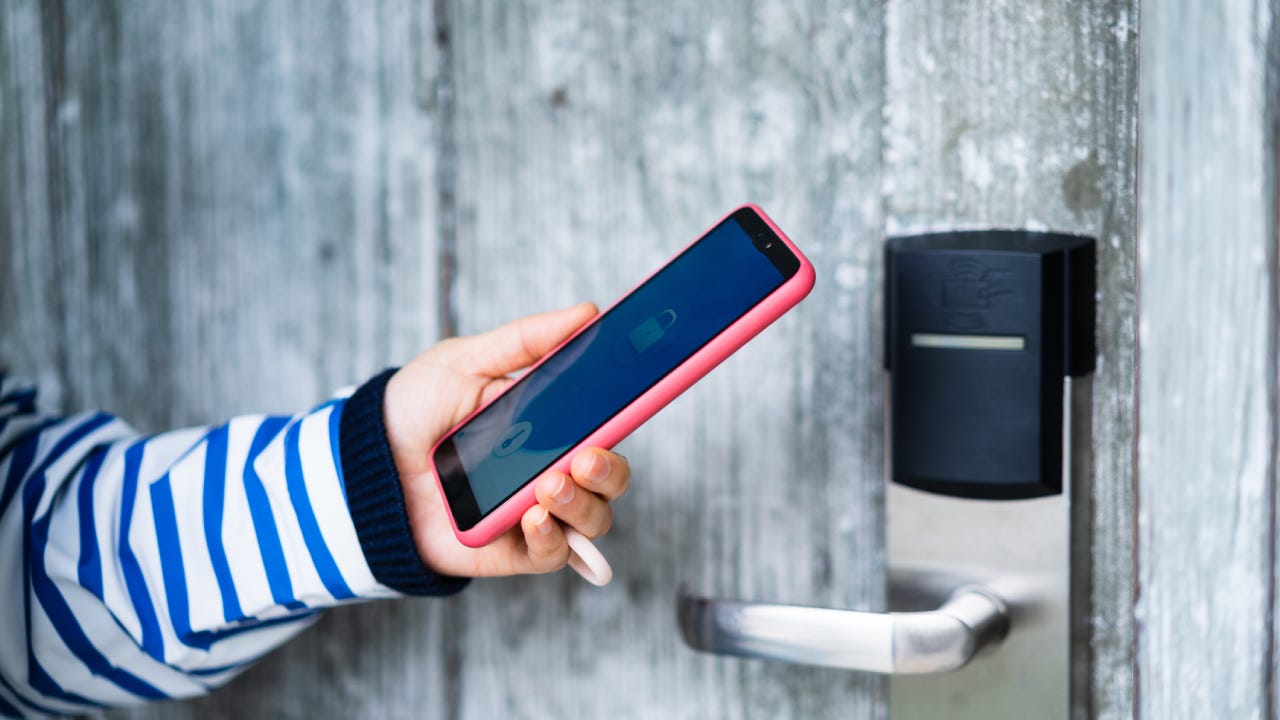How do biometric locks impact your homeowners insurance?




Keeping your property safe and secure is likely a top priority if you are a homeowner. One way to do that is with biometric locks, which use a personal identification number (PIN) or a personal characteristic, such as a fingerprint or retina scan, to maintain your home’s security. It’s natural to wonder if the coverage of these locks and remote devices can net you a discount on your insurance. They can, in some cases, but only if they are part of a complete security system. They may offer benefits by themselves, but insurers don’t see them as something that makes your home necessarily safer. Thus, you generally won’t find a home insurance discount for these locks.
What is a smart lock?
A smart lock uses wireless technology (and your home’s internet network) to lock or unlock your door and offers a more flexible solution than the traditional lock and key. Replacing your home’s lock with a smart lock could save you the cost of having your door rekeyed after someone moves out or a key is lost or stolen. Biometric smart locks use personal biological information, like a fingerprint or retinal scan, to access the lock. Other smart lock technologies may use wireless keyfobs, keypads, touchscreens and apps instead of biometric data.
With a smart lock, you can reprogram access for free and set as many (or few) users as you would like. There is no need to contact a locksmith and pay for a service call. Changes can be made nearly instantly. Depending on the smart lock, you could even set a user up for a limited amount of time, which could come in handy if you have a contractor working in your home. You could give the contractor access for certain hours within a number of days so the worker can complete the project in the time allotted. A smart lock could also enable you to provide access to realtors showing your house if you put it on the market.
Common types of smart locks include:
- Keypad door lock: You will need to set and enter a pin to unlock the door.
- Wireless door lock: A wireless lock connects to your phone via Bluetooth and comes with a smartphone app that can open and close the front door. You can typically also remotely open or lock the door through the app.
- Proximity door lock: These door locks often come with a small keyfob that can lock or unlock a door when held within close range of the door lock.
Most smart locks come with a backup key in case your power or internet connection fails, so you are not locked out.
How secure are smart locks?
Smart locks are generally safe if you follow some basic security protocols. Most smart locks are connected to your home’s wireless network. As long as your home network is secured so it can only be accessed using a password that you and trusted individuals know, your smart locks should be a safe security measure.
Keeping and managing your PINS carefully is the key to ensuring that they are secure. It is generally recommended to avoid using passwords or PINS based on personal information, such as your birthday or phone number, as they are more likely to be compromised. Avoid writing down your smart lock code in a way that can be easily found or identified, such as keeping a sticky note labeled “smart lock” in your vehicle or bag. The same goes for any backup keys that may be used if the system is not operating due to an internet outage. Keep the key in a safe, private place, so no unwanted individuals have access to it.
As for the smart lock hardware itself, security experts indicate it may not be any safer than a traditional deadbolt. While you may not have a spare key to worry about, your lock’s system could be overridden by a skilled hacker if its cyber security is lacking, or determined burglars could choose to enter your home through a window or other point. A smart lock is most secure when it is an integrated part of a complete home security system.
Will biometric locks affect my homeowners insurance?
While coverage for your locks and remote devices is likely to be included in your policy, most home insurance companies will not offer a discount solely because you have installed them — unless they are part of a more extensive integrated security system.
In general, insurers don’t see smart locks, alone, as enough of an increase in security to warrant savings. For now, smart locks and other smart home devices are still largely considered a convenience. As technology develops, that may change. However, many carriers offer discounts on homeowners insurance for security systems.
Many other factors go into determining your home insurance premiums. Insurers consider your home’s location and age, safety devices, rebuilding costs and more when calculating rates. Finding the cheapest home insurance company for you can often mean shopping around and comparing multiple providers based on cost, coverage and available discounts.
A homeowners insurance discount for security system installations will likely reduce your home insurance premiums for years to come. Insurance companies that offer a discount for home security systems include:
Security system premium discounts are pretty standard, though, so be sure to shop around to learn more about carriers in your area that offer the best home insurance discounts.
Pros and cons of biometric locks
Biometric locks can provide great convenience and keep unwanted individuals from picking your lock in a traditional sense. Still, software-based locks can still be hacked, although doing so requires a different set of skills and tools than for physical locks. However, many smart and biometric locks can create and maintain logs of when they are activated.
These conveniences do come at a cost. Biometric locks are one of the more expensive types of smart locks around and generally cost significantly more than traditional hardware locks. The biggest downside for some of these locks is that they can depend on your home’s electricity and internet. If the internet or power goes out, some devices won’t work.

Pros
- Unlock with a touch or glance
- Harder to pick or hack for most people
- Many provide real-time data about their usage status

Cons
- Typically expensive
- Unlikely to lower home insurance rates, alone
- Can be dependent on your home’s electricity and internet to function
Frequently asked questions
You may also like

How a speeding ticket impacts your insurance in Oregon

Home insurance isn’t just more expensive, it’s also harder to get in 2025


